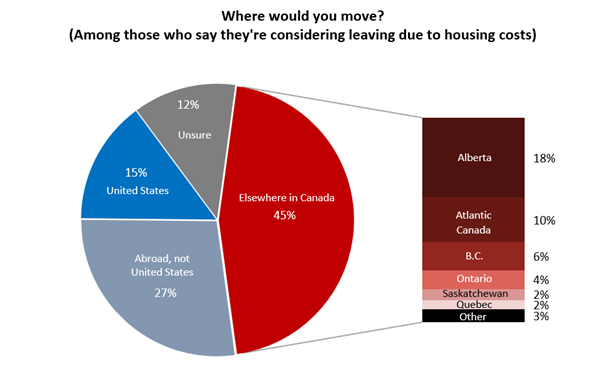Results from a recent survey show 28 per cent of Canadians are “seriously considering” moving out of their province due to housing affordability.

Beyond that, while the Angus Reid Institute (ARI) has seen recent trends showing Canadians concentrating in Alberta and moving south, the poll shows 42 per cent of Canadians are looking for a way out of Canada altogether.
They are trends the institute says it can see “potentially increasing in coming years,” despite a cooling housing market.

- Trump slams Canada as U.S. House passes symbolic vote to end tariffs
- ‘We now have to figure out how to live life without her’: Mother of Tumbler Ridge shooting victim speaks
- Carney, federal party leaders to attend Tumbler Ridge shooting vigil Friday
- Mental health support after Tumbler Ridge shooting ‘essential,’ experts say
“Though the countrywide ramp up of housing prices has slowed, rent has continued to rise across the country, with some provinces seeing year-over-year average rent increases of more than 17 per cent,” it said.
For people who have been living in the country for less than a decade, the ARI survey shows almost four in 10 would like to leave their province.
On top of that, ARI said fewer permanent residents (PR) are becoming citizens. As of 2021, it said 45 per cent of those with PR status became citizens, versus 75 per cent in 2001.
Reuben Garang, director of Immigration Partnership Winnipeg, said that is not completely surprising.
“When you come to a new place, you deal now with the reality of the new place. It depends on how people experience the realities of the new place,” he said. It can be a quick turnaround for those who have left their former countries.

Get daily National news
As an example, Garang said the weather can be relatively shocking.
But it can also boil down to something of more substance.

“A lot of the people that are here, (are) sometimes working two jobs and sometimes not enough to pay the rent and put the food on the table. And when the cost of housing is up, it’s going to eat into the other budgets you have,” he said, adding that many people living in poverty in Manitoba are newcomers.
Garang also said the kind of work someone gets can be a factor in them wanting to pick up and head out.
“There are people that migrated here that had good education, had a better job where they came from. When they come here, if they were doctors, for example, or engineers, and they come here and then they become taxi drivers, then that also factors into their definition of the quality of life,” he said.
It’s a reflection throughout the province for newcomers and others.

In Manitoba, seven per cent of respondents “strongly agreed” that the cost of housing was why they were considering taking off. More than double that said they’re wanting to pack their bags in search of a higher quality of life, the poll showed.
In response, Premier Wab Kinew said his government is working to build more affordable housing, but is also having conversations around culture.
“What are those things to do in the evenings and weekends (where) a young person is going to say, ‘Hey, Manitoba is a place that I want to be.’ For some people, that’s going to be festivals and restaurants, concerts, and the arts. For other people, it means going to Cabela’s and then hitting the road to go check out the lakes and the outdoors on the weekend,” he said.
“Let’s just make sure that we keep it affordable, and we keep building on those strengths, whether it’s the cultural space, or the outdoor space.”
Other Manitobans said proximity to family, health-care access, cost of living and extreme weather events were primary factors in wanting to move.
Garang said the solution to getting people to stay is multi-faceted.
“Life is not about one thing,” he said. “You may have a job, but if you don’t have a social life, then that’s the problem too. You might have housing, but if you don’t have a social life, that’s also another problem.
“Integrating all those aspects that are needed in making people have a better life — supporting them socially, morally, culturally, economically — those are some of the things that are needed for anyone, not just only newcomers, but all the people that are struggling to have a better life in our province,” he said.
For newcomers, he said, time is of the essence.
“The first two years of arrival here are very critical. If people are supported well, then they will establish faster and integrate smoothly into society,” he said.
Despite the overcast state of housing affordability in the province, the poll shows that Manitobans have a sunny disposition.
Almost half agreed that housing affordability “will improve over the next few years,” while 27 per cent strongly agreed. Fourteen per cent of respondents said they strongly disagreed.
Renters expressed the most doubt that relief is on the way, whereas homeowners who have paid off their mortgage are the most optimistic.
The poll surveyed more than 4,200 people, with an error margin of about 1.5 percentage points.















Comments
Want to discuss? Please read our Commenting Policy first.